|
|
|
Sort Order |
|
|
|
Items / Page
|
|
|
|
|
|
|
| Srl | Item |
| 1 |
ID:
085598
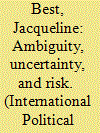

|
|
|
|
|
| Publication |
2008.
|
| Summary/Abstract |
In this paper, I argue that critical international theory could benefit from a broader and deeper conception of the limits of knowledge-that what is needed is more attention to the role of ambiguity in contemporary politics. While not challenging the usefulness of the more prevalent concepts of uncertainty and risk used by scholars applying the frameworks of global governmentality and world risk society, this essay proposes that we understand risk and uncertainty as two specific categories of indeterminacy that have come to preoccupy contemporary neoliberal thinkers and policy-makers, and hence their critics, but which nonetheless tend to downplay the interpretive dimensions of the limits of knowledge. Drawing on Michel Foucault's The Order of Things, as well as the ideas of John Maynard Keynes, I develop an analysis of the role of ambiguity in global governance-as an object of global governance, a tool to be exploited by it, and a limit to its operation. Concluding with the case of international financial governance, this essay suggests that not only will a focus on ambiguity shed light on the historical evolution of global finance, but it also provides us with some clues to the sources of the current subprime financial crisis.
|
|
|
|
|
|
|
|
|
|
|
|
|
|
|
|
| 2 |
ID:
113972
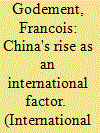

|
|
|
|
|
| Publication |
2012.
|
| Summary/Abstract |
The term 'peaceful development' has created ambiguity. It fails to capture the extent to which China has become a global influence whose economic policy decisions are essential to the world multilateral system. China's international strategy can no longer be guided only by the quest for 'stability' and by the principle of non-interference, because change and interdependence are a hallmark of this century. Neither can a relationship with the United States alone define China's international strategy. Hopefully, China will understand the usefulness for rising powers of making long-lasting compromises, and it will strengthen instead of weaken a set of international institutions that have allowed for the most prosperous and peaceful era in human history.
|
|
|
|
|
|
|
|
|
|
|
|
|
|
|
|
| 3 |
ID:
111480
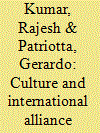

|
|
|
|
|
| Publication |
2011.
|
| Summary/Abstract |
International alliance negotiations are now a pervasive feature of the contemporary global economy. As the alliancing firms cross national boundaries to forge cooperative partnerships they face the inevitable necessity of bridging the cultural divide to ensure successful negotiation. Existing research has focused primarily on the impact of national cultural differences in shaping negotiating strategies and ensuing outcomes. Less attention has been paid to how negotiators from different cultures understand and manage the ambiguity of international alliance negotiations. We employ the theoretical lens of sensemaking to understand how negotiators embedded in different cultures manage simultaneously the task and cultural related ambiguity that they are confronted with. This perspective suggests the critical role that `tertius iungens' (the `third who joins') plays in facilitating the negotiation process. The `tertius iungens' represents a form of intermediation that acts as a catalyst in the negotiation process. We propose three alternative types of intermediation, namely, cognitive, affective, and holistic and provide illustrative examples of these types of intermediation. We conclude by highlighting the theoretical and managerial significance of our framework and by suggesting future directions for research.
|
|
|
|
|
|
|
|
|
|
|
|
|
|
|
|
| 4 |
ID:
148888
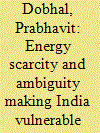

|
|
|
|
|
| Summary/Abstract |
Energy is a vital component of development and its utilization pattern
is significant determinant of the growth of a nation. So its quantity,
quality and sources of availability are important elements in the
measurement of a country’s comprehensive national power. Rapidly
increasing energy demand and growing concern about economic and
environmental consequences call for an effective and thorough energy
governance in India. Strengthening our fuel reserves and diplomatic
relationship with a wide range of oil rich nations; developing technology
to nurture indigenous energy resources such as hydroelectricity, wind
and solar energy along with efficient machines/mechanisms for energy
use/distribution and honest policies framing to get rid of ambiguity
over all these issues can be the panacea for resolving the energy crises
in India.
|
|
|
|
|
|
|
|
|
|
|
|
|
|
|
|
| 5 |
ID:
124532


|
|
|
|
|
| Publication |
2013.
|
| Summary/Abstract |
This article provides a close reading of three of Murakami Haruki's most representative love stories: Norwegian Wood, South of the Border, West of the Sun, and Sputnik Sweetheart. It aims to explore the representation of love in these novels through investigating their equivocal or inconclusive endings. I argue that equivocality is incorporated into these memoir-style works of fiction by analysing narrative features of the final scene. Norwegian Wood is narrated in such a way that the centre of orientation gradually shifts from the 'narrating self' to the 'narrated self', a shift that reduces the distance between narrator and reader and adds indeterminacy to the ending. The last episode of Sputnik Sweetheart is temporally destabilised by a shift to simultaneous narration, making the scene appear imaginary or unreal. In South of the Border, West of the Sun, the plot arrangement allows for multi-interpretation. I argue that Murakami, in all these stories, has purposefully adopted these devices to avoid determinacy or definiteness, and such inconclusiveness complements and reflects his concept of love.
|
|
|
|
|
|
|
|
|
|
|
|
|
|
|
|
| 6 |
ID:
105497
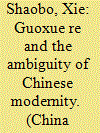

|
|
|
| 7 |
ID:
144363
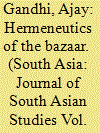

|
|
|
|
|
| Summary/Abstract |
This paper presents an ethnographic study of a redevelopment controversy in Delhi's old city. It considers the perspectives of traders, hawkers, politicians and officials on the proposed revamping of the Meena Bazaar. The paper illustrates how hermeneutic and aesthetic dimensions suffuse public and political life in India. Specifically, sincere intentions, evoked in speech and performance, are seen as a prerequisite of public presentation and as a locus of interpretive scrutiny. In an ambiguous and indeterminate milieu, promises and motives are probingly assessed, often in ironic and dramaturgical form. The paper foregrounds the ‘hermeneutics of the bazaar’, an interpretive sensitivity to intentionality, and ‘structured sincerity’, the efficacy, and reflexive steering, of performed conviction.
|
|
|
|
|
|
|
|
|
|
|
|
|
|
|
|
| 8 |
ID:
140429
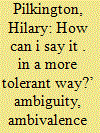

|
|
|
|
|
| Summary/Abstract |
Although survey data identify no significant predictor of intolerance among the Russian population, young people are considered to display heightened levels of ethnic intolerance and radical variants of xenophobia. Drawing on survey and semi-structured interview data from a study of patriotism among young people in two cities in the North-West region of Russia, this article explores the strength of ethnic self-identification and ethnically exclusive notions of Russianness and compares levels and forms of ethnic intolerance. Identifying that routine expression of xenophobic sentiments coexists alongside a commitment to principles of ethnic equality, the article considers what the ambiguities and contradictions in the articulation of intolerance tell us about how young people negotiate complex contemporary multicultural societies.
|
|
|
|
|
|
|
|
|
|
|
|
|
|
|
|
| 9 |
ID:
190914
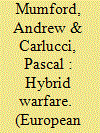

|
|
|
|
|
| Summary/Abstract |
This article presents the study of ambiguity as the essence of hybrid warfare to reconcile it with the international political context. It addresses the gaps in the literature in an effort to elucidate the essence of hybrid warfare not as a separate concept, but rather as the symptom of a changing political environment. The analysis of the literature is reinforced by two case studies: the war in eastern Ukraine of 2014 and the South China Sea dispute. Both these case studies express ambiguity in the combination of kinetic and non-kinetic means used to achieve political objectives. The article rests on three pillars that constitute the architecture of the central argument. The first pillar will address the gap in the current literature on hybrid warfare and how the current debate is too concerned with conflict dynamics rather than its political nature. The second pillar will delineate the essence, characteristics, and value of ambiguity in hybrid warfare. The third pillar will address the practice of hybrid warfare as the conduct of war by great powers.
|
|
|
|
|
|
|
|
|
|
|
|
|
|
|
|
| 10 |
ID:
183699
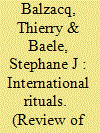

|
|
|
|
|
| Summary/Abstract |
The performance of ritual and the ritualisation of performance are the two main theoretical repertoires of ritual study in international politics and beyond. However, they also escalate tensions between those who insist on ritual's ability to operate by virtue of participants’ presence and those who believe that global networks of media call for a representational turn, which must tie participants and audiences across borders. Should we fail to understand how these distinct theoretical repertoires interact, it would be difficult to study international ritual, identify its functions, and trace its effects. Anchored in the sociology of ‘social occasions’, this article weaves ritual's patterns, properties, and resources into a coherent analytical framework. The framework enables us to better to grasp how actors move between/within different worlds (ritual and performance) and to what effects. The comparative study of two post-terrorism ritual occasions (the 2011 Rose March in Oslo and the 2015 Republican Marches in France) illustrates the usefulness of this theoretical proposition and its related framework.
|
|
|
|
|
|
|
|
|
|
|
|
|
|
|
|
| 11 |
ID:
119170
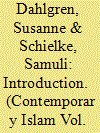

|
|
|
| 12 |
ID:
185360
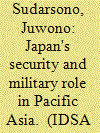

|
|
|
| 13 |
ID:
146650
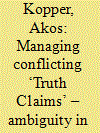

|
|
|
|
|
| Summary/Abstract |
The article is a study of managing interstate relations via ambiguity and secrecy. At the focal point of the article is the different constitutive logic of domestic politics and diplomacy in conceiving and managing social reality; with the former implying the notion of community and the latter separateness – the difference that allows for diplomatic conduct to rely on tacit agreements and ambiguity for managing contradictory ‘truth claims’, as China and Japan did in the case of the Ryukyu and later the Senkaku Islands. Such successful management is conditional on the parties' ability to control domestic narratives avoiding contradictions in their ‘truth claims’ becoming too blatant. Yet, modern technologies increasingly undermine states' capacities for this. The leaking on YouTube of the collision of a Chinese trawler with the ship of the Japanese Coast Guard in 2010 offers a perfect example. The incident aggravated the conflict and triggered intense debates on secrecy in Japan. The article concludes by arguing that once ambiguity and tacit agreements break down, leaders should turn to their public – recognize that noisy nationalist are frequently but a minority – and attempt to renegotiate ‘truth claims’ domestically to create the basis for a compromise.
|
|
|
|
|
|
|
|
|
|
|
|
|
|
|
|
| 14 |
ID:
155767
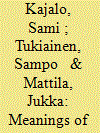

|
|
|
|
|
| Summary/Abstract |
This paper studies what kinds of meanings reserve officers ascribe to military ranks. The study builds on existing literature on reserve forces and hypothesizes that military ranks among reserve officers are subject to rendering the ranks with multiple meanings, and which are bound to create ambiguity of interpretation. To elaborate these theoretical insights a survey among Finnish reserve officers was conducted (N = 6193). The data was analyzed using factor analysis and correlation analysis. The results show that military ranks are ascribed, in addition to the functionalistic, hierarchical meaning, also with meanings of prestige, proficiency, and identity. The main theoretical contribution of the paper is in complementing the previous literature on ambiguity of military ranks by specifying four different meanings in the interpretation of the ranks.
|
|
|
|
|
|
|
|
|
|
|
|
|
|
|
|
| 15 |
ID:
144359
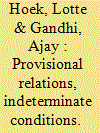

|
|
|
|
|
| Summary/Abstract |
In the introduction to this special section, we present six ethnographic articles that explore the sites and forms of ‘non-sociological sociality’ in South Asia. Set in urban spaces where the familiar vectors of relations, such as ethnicity, class, gender or age, may be attenuated, the articles examine how social and political entanglement is suffused with ambiguity, indeterminacy, provisionality and contingency. In these sites, opaque conditions, open-ended play, double meanings and interpretive scrutiny abound. Spaces such as the racecourse, the bazaar, the university campus or the nocturnal street suggest undetermined conditions and fleeting collaborations which have a wider bearing on cross-cutting forms of sociality in South Asia.
|
|
|
|
|
|
|
|
|
|
|
|
|
|
|
|
| 16 |
ID:
110860
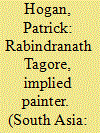

|
|
|
|
|
| Publication |
2012.
|
| Summary/Abstract |
This essay examines the idea of implied authorship in relation to painting. It considers a painting by Tagore, arguing that enigmas in the painting may be partially resolved by reference to ideas from a range of Tagore's works. This suggests that, beyond the implied author of a particular work, we should consider the implied author across a canon of works. This canonical implied author does not substitute for the implied author of an individual work. However, it provides one important context for interpretation. Moreover, it does not render the work unequivocal, but alters the profile of ambiguity of the work.
|
|
|
|
|
|
|
|
|
|
|
|
|
|
|
|
| 17 |
ID:
160736
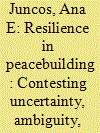

|
|
|
|
|
| Summary/Abstract |
With the failure of liberal peace strategies in the Global South, resilience has recently become the risk management strategy par excellence in peacebuilding. Since it is not possible to predict when the next crisis will take place, peacebuilders must invest in bottom-up adaptive capacities to cope with external shocks. This article moves away from governmentality accounts of resilience which are overtly deterministic and depoliticizing. Instead, it posits that the uncertainty, ambiguity, and complexity associated with resilience mean that we should expect opportunities for contestation and institutional agency. This argument will be illustrated by drawing upon the European Union’s adoption of the resilience approach in its peacebuilding and security policies. The article argues that while uncertainty, ambiguity, and complexity constitute the ontological conditions that underpin the rise of resilience in peacebuilding, they are also likely to lead to its potential demise.
|
|
|
|
|
|
|
|
|
|
|
|
|
|
|
|
| 18 |
ID:
145421
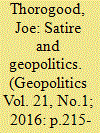

|
|
|
|
|
| Summary/Abstract |
Humour and laughter have become the subject of recent geopolitical scrutiny. Scholars have explored the affirmative and liberatory possibilities of humour, and the affective bodily dimensions of laughter as tools for transformative action in critical geopolitics. Humour that is vulgar and politically ambiguous is yet to be explored as a potent geopolitical avenue of enquiry. Studies of satire have suggested that rather than contesting entrenched geopolitical beliefs, satirical shows can serve to further divide audiences both amenable and antagonistic to the satire in question. I argue that this should not involve a wholesale rejection of satirical shows, as humour that uses irony, subversion, and other discursive techniques is just one way satirical media becomes an effective commentator on political issues. I examine the show South Park and argue its satire combines bodily and scatological humour with more traditional satirical techniques to produce a comedy that ridicules contemporary issues by reducing complex politics to the most basic and crass condition possible. This is defined in a Bakhtinian sense of the body grotesque, a social inversion through reference to the common bodily functions of all human beings.
|
|
|
|
|
|
|
|
|
|
|
|
|
|
|
|
| 19 |
ID:
112366
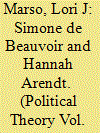

|
|
|
|
|
| Publication |
2012.
|
| Summary/Abstract |
This article compares Hannah Arendt's famous essay on Adolf Eichmann's trial in Israel in 1961 to Simone de Beauvoir's little studied piece, "An Eye for an Eye," on the trial of Robert Brasillach in France in 1945. Arendt and Beauvoir each determine the complicity of individuals acting within a political order that seeks to eliminate certain forms of otherness and difference, but come to differing conclusions about the significance of the crimes. I explain Beauvoir's account of ambiguity, on which she draws in her judgment of Brasillach and elaborates in her 1948 Ethics of Ambiguity, and measure it against Arendt's account of Eichmann's thoughtlessness and its effects on the destruction of conditions of worldly plurality. Linking the failure of ethical judgment on the part of individuals to prior systemic political conditions, Beauvoir helps us recognize struggles over the meaning of bodies and conditions of inequality as central to politics.
|
|
|
|
|
|
|
|
|
|
|
|
|
|
|
|
| 20 |
ID:
149775
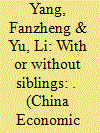

|
|
|
|
|
| Summary/Abstract |
We employ a well-controlled laboratory experiment to examine whether only children and those with siblings differ in their willingness to compete. We find that only children are more likely to undervalue the chance of winning and shy away from competition, but they become to embrace competition as their self-assessed winning probability increases. Alternatively, once uncertainty of relative performance is removed, the gap in willingness to compete between the two groups disappears. Utilizing a two-stage model of decision weights under uncertainty, we find that such a gap is predominantly caused by their heterogeneous attitudes toward ambiguity.
|
|
|
|
|
|
|
|
|
|
|
|
|
|
|
|
|
|
|
|
|